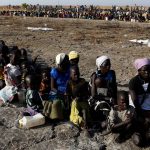National Association of University Students has called on the Federal Government to, as a matter of urgency, do everything possible to bring back all Nigerian Students schooling in Sudan.
They complain that their fellow students are stranded and needs the help of the Federal Government, now more than ever.
The crisis which erupted in Khartoum between the Sudanese army and the paramilitary rapid support forces, over control of the troubled country, have left many nigerian students stranded.
In the wake of the crisis, the federal government encouraged Nigerian students in Sudan to remain indoors while it makes efforts for their safe evacuation from the country.
But this Student body want the government to be more urgent with its evacuation plans as Nigerians students are now stranded amid a rapidly deteriorating situation.
The Student’s body is worried about the recent killings reported in some university Campuses in Nigeria, and calls on the Inspector General of police to investigate and bring the perpetrators to book.
With less than a month to the inauguration of a new government, the students seek to be represented in the Federal Executive Council in the new administration.
WARRING GROUPS IN SUDAN AGREE 72 HOUR CEASEFIRE
The warring parties in Sudan have agreed to a three-day ceasefire starting midnight on Tuesday, as many countries are racing to evacuate civilians from the battle-scarred African country.
“Following intense negotiation over the past 48 hours, the Sudanese Armed Forces (SAF) and the Rapid Support Forces (RSF) have agreed to implement a nationwide ceasefire starting at midnight on April 24, to last for 72 hours,” U.S. Secretary of State Antony Blinken said on Monday in a written statement.
Previous attempted ceasefires had failed as the brutal fighting, entering a second week, has killed at least 427 people and wounded more than 3,700, according to UN agencies.
Hours before Blinken’s announcement, UN Secretary-General, Antonio Guterres, had warned that the violence “risks a catastrophic conflagration within Sudan that could engulf the whole region and beyond”
He, however, called on UN Security Council members to exert maximum leverage.
In a statement on Monday, the RSF said it had agreed to the truce “in order to open humanitarian corridors, facilitate the movement of citizens and residents.
“Also to enable them to fulfill their needs, reach hospitals and safe areas, and evacuate diplomatic missions.”
Over the weekend, countries had evacuated their diplomats and citizens as fighting raged in densely populated parts of the capital.
Brief lulls in the conflict have allowed foreign civilians to flee Sudan to safety.
The current three-day ceasefire, if it endures, might generate a chance to deliver essential resources such as food and medical supplies to those in need.














